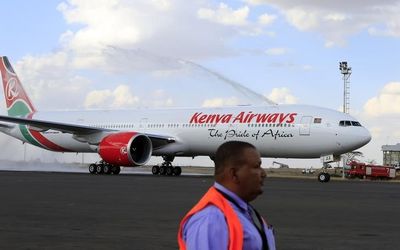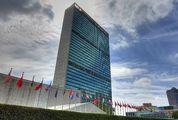AIRPORTS are the windows to the soul of a country. They reflect the care a country imparts to its wellbeing; how it perceives itself, what it deems important and what financial state it is in; how it prefers visitors; and, most importantly to investors, how to view it.
Take Lusaka airport: it portrays the grandeur of an era long past, with copper as the sole driver of its economy. That has come home to roost, with the commodity crisis blowing Zambia’s sovereign credit spread sky high.
Often, there is no water in the airport, the departure lounge’s lack of basic facilities is abysmal, and the single bar is reminiscent of a third-grade Margate joint. The building is fine: all it needs is a good nip and tuck and sound management.
Botswana used to be the same. Gaborone had an airport the size of a double garage; it had no air-conditioning, and no window could open, resulting in a suffocating, claustrophobic ramshackle outpost.
The Chinese recently rebuilt it into an enormous five-storey hollow shed, with second-rate furnishings and defective toilet seats. Not surprisingly, the contract was terminated before the project was completed. That was a few years ago and it is still incomplete; in fact, it already needs a revamp due to lack of maintenance.
Mozambique’s capital has the same airport building as Botswana’s; it is identical in structure and material and appearance, but modified to fit the available space (it is in Maputo city) and at least it looks different.
The Mozambicans have also taken their time to appoint decent departure lounges, restaurants and shops, and the effect is most appealing. It imparts a sense of wellbeing and progress.
Windhoek’s airport is small, clean and efficient. There is nothing more to it. So is Accra’s.
Dakar is a mess, a disgrace for a country of international status and representation. So is Dar es Salaam. It has an "international" hotel at the airport — just don’t try to access it after eight at night. Don’t be forceful about it either — I tried and came close to spending the evening incarcerated.
Nairobi is being rebuilt — it is dreary and to be avoided at all costs. Luanda is OK-ish, having been upgraded for the Africa Cup of Nations. Tip: don’t touch or move ropes designating the waiting lines at the passport check and don’t duck underneath the ropes — it creates most unwelcome comment and rough handling.
Second tip: Angola built a brand-new airport, far outside Luanda. Due to inadequate roads leading to the airport, it is inaccessible — unless you plan a day trip.
The African cities that have decent sized and well-presented airports include Casablanca, Marrakech, Abidjan, Port Louis and perhaps, Addis Ababa.
Kigali is too small to count, although the policy of confiscating any and all plastic bags is marvellous. Hear, hear for Kigali, the cleanest city in Africa. Entebbe is forgettable, Tripoli to be avoided.
Which is the worst? It is no surprise that it is Lagos. Take a deep breath … It is not only being there, it is also getting there — an entire afternoon wasted in traffic, with chaos reigning at all times at the airport. You absolutely have to use "official protocol" (read between the lines) to get anywhere.
Point being, you need cash. Bribery is open and innate, inbred and inculcated. It is how the country operates. It supports and condones self-interest before anything else. Our Johannesburg metro police demanding "free lunch" to ignore speeding fines need to spend time in Lagos to truly understand coercive graft.
Which is the best? Easy one — any of Johannesburg, Cape Town or Durban. All three are world-class and exquisite airports. You actually wish to go to the airport for Sunday lunch, taking the entire family.
What do we learn from the exercise?
One: money has recently been spent by African countries that could afford it to upgrade airports. Those that could not afford it sold the country’s heirloom and crown jewels to upgrade.
Two: the cheap offshore money is now finished. In future, China will demand even greater access to family jewels to spend any more on African cities.
Three: we are all facing junk status (with the exception of Mauritius and Botswana). We need to prioritise and curb spending, especially on public servants’ salaries and perks.
Four: we need to be proud and clean and beautify what we have. It does not have to be new or big to be impressive and admired.
The main lesson is: Africa be wise and don’t go back into being heavily indebted poor countries. We all recently came out of it with huge debts written off or restructured.
Zambia — you need to chill on the borrowings. You were the most sought-after African debt not even three years ago, and now?
The African family jewels are depleted and promises need to be honoured. The Heart of Darkness has returned, not as a physically enslaving master, but as self-imposed debt.

Nairobi’s airport is being rebuilt — it is dreary and a last resort as a travel option to be avoided at all costs, advises the writer. Picture: REUTERS
AIRPORTS are the windows to the soul of a country. They reflect the care a country imparts to its wellbeing; how it perceives itself, what it deems important and what financial state it is in; how it prefers visitors; and, most importantly to investors, how to view it.
Take Lusaka airport: it portrays the grandeur of an era long past, with copper as the sole driver of its economy. That has come home to roost, with the commodity crisis blowing Zambia’s sovereign credit spread sky high.
Often, there is no water in the airport, the departure lounge’s lack of basic facilities is abysmal, and the single bar is reminiscent of a third-grade Margate joint. The building is fine: all it needs is a good nip and tuck and sound management.
Botswana used to be the same. Gaborone had an airport the size of a double garage; it had no air-conditioning, and no window could open, resulting in a suffocating, claustrophobic ramshackle outpost.
The Chinese recently rebuilt it into an enormous five-storey hollow shed, with second-rate furnishings and defective toilet seats. Not surprisingly, the contract was terminated before the project was completed. That was a few years ago and it is still incomplete; in fact, it already needs a revamp due to lack of maintenance.
Mozambique’s capital has the same airport building as Botswana’s; it is identical in structure and material and appearance, but modified to fit the available space (it is in Maputo city) and at least it looks different.
The Mozambicans have also taken their time to appoint decent departure lounges, restaurants and shops, and the effect is most appealing. It imparts a sense of wellbeing and progress.
Windhoek’s airport is small, clean and efficient. There is nothing more to it. So is Accra’s.
Dakar is a mess, a disgrace for a country of international status and representation. So is Dar es Salaam. It has an "international" hotel at the airport — just don’t try to access it after eight at night. Don’t be forceful about it either — I tried and came close to spending the evening incarcerated.
Nairobi is being rebuilt — it is dreary and to be avoided at all costs. Luanda is OK-ish, having been upgraded for the Africa Cup of Nations. Tip: don’t touch or move ropes designating the waiting lines at the passport check and don’t duck underneath the ropes — it creates most unwelcome comment and rough handling.
Second tip: Angola built a brand-new airport, far outside Luanda. Due to inadequate roads leading to the airport, it is inaccessible — unless you plan a day trip.
The African cities that have decent sized and well-presented airports include Casablanca, Marrakech, Abidjan, Port Louis and perhaps, Addis Ababa.
Kigali is too small to count, although the policy of confiscating any and all plastic bags is marvellous. Hear, hear for Kigali, the cleanest city in Africa. Entebbe is forgettable, Tripoli to be avoided.
Which is the worst? It is no surprise that it is Lagos. Take a deep breath … It is not only being there, it is also getting there — an entire afternoon wasted in traffic, with chaos reigning at all times at the airport. You absolutely have to use "official protocol" (read between the lines) to get anywhere.
Point being, you need cash. Bribery is open and innate, inbred and inculcated. It is how the country operates. It supports and condones self-interest before anything else. Our Johannesburg metro police demanding "free lunch" to ignore speeding fines need to spend time in Lagos to truly understand coercive graft.
Which is the best? Easy one — any of Johannesburg, Cape Town or Durban. All three are world-class and exquisite airports. You actually wish to go to the airport for Sunday lunch, taking the entire family.
What do we learn from the exercise?
One: money has recently been spent by African countries that could afford it to upgrade airports. Those that could not afford it sold the country’s heirloom and crown jewels to upgrade.
Two: the cheap offshore money is now finished. In future, China will demand even greater access to family jewels to spend any more on African cities.
Three: we are all facing junk status (with the exception of Mauritius and Botswana). We need to prioritise and curb spending, especially on public servants’ salaries and perks.
Four: we need to be proud and clean and beautify what we have. It does not have to be new or big to be impressive and admired.
The main lesson is: Africa be wise and don’t go back into being heavily indebted poor countries. We all recently came out of it with huge debts written off or restructured.
Zambia — you need to chill on the borrowings. You were the most sought-after African debt not even three years ago, and now?
The African family jewels are depleted and promises need to be honoured. The Heart of Darkness has returned, not as a physically enslaving master, but as self-imposed debt.


















Change: 0.91%
Change: 0.81%
Change: 2.99%
Change: -0.19%
Change: 2.23%
Data supplied by Profile Data
Change: -0.43%
Change: 0.15%
Change: 0.91%
Change: 0.00%
Change: -0.07%
Data supplied by Profile Data
Change: 0.01%
Change: -0.48%
Change: -0.29%
Change: 0.00%
Change: 0.46%
Data supplied by Profile Data
Change: 0.61%
Change: 2.35%
Change: 0.77%
Change: 3.79%
Change: 2.53%
Data supplied by Profile Data